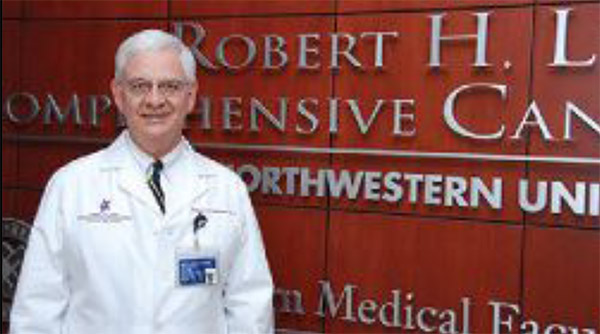Dr. Catalona’s Research Program Seeking Patients Who Have Been Managed with Active Surveillance

Last summer, the National Cancer Institute (NCI) awarded an $11.5 million 5-year grant to the Prostate SPORE (Specialized Project of Research Excellence) at Northwestern University. Dr. Catalona is Principal Investigator of this collaborative research group and co- leads one of the SPORE’s main projects. The ultimate goal of SPORE projects is to improve clinical approaches to treating cancer. Today, the group’s research projects are underway.
Dr. Catalona co-leads a SPORE project entitled “Impact of germline genetic variants on failure of active surveillance for prostate cancer” with Dr. John Witte from University of California-San Francisco and Dr. Charles Brendler from NorthShore University HealthSystem.
About the project
Doctors can use active surveillance (AS) to avoid over- treating prostate cancer patients. However, we need better biological markers to avoid recommending AS to someone who could have undiagnosed aggressive cancer.
About 14% of men are diagnosed with prostate cancer. About 80% of these men have localized disease and more than 80% have early treatment. However, only about 3% end up dying from prostate cancer. Men with low-risk prostate cancer may want to avoid treatments such as surgery or radiation, which can have undesired side effects. AS is an alternative to treatment involving careful monitoring for signs of progression. During the course of AS, if tests indicate that the cancer is growing, doctors can recommend appropriate treatments.
Up to about 60% of men withdraw from AS within 10 years. While some of the patients stop AS because of anxiety due to the feeling of uncertainty during the surveillance period, most patients who “fail AS” have undiagnosed aggressive cancer that may have benefited from earlier treatment. We don’t yet know what the impact of delayed diagnosis will be, but up to 50% of patients who delay treatment have PSA recurrence. Some of these men develop metastases and die of prostate cancer.
Genetics is a strong factor in prostate cancer. Genome-wide association studies (GWAS) have found about 160 genetic variants associated with prostate cancer risk. Together, these variants explain more than 35% of the inherited risk. Some of these variants have also been linked with prostate cancer aggressiveness, although the findings have been inconsistent. We hope to clarify these results by looking at genetic variants and AS failure.
This research project addresses the hypothesis that some men eligible for AS may actually have genetic variants linked with AS failure. We will use genotyping technology on blood samples to identify variants associated with prostate cancer that also impact AS failure. Identifying genetic variants in men with low-risk prostate cancer may improve treatment decisions.
The project has four specific aims. The first aim will use statistics to examine the genotyping data on more than 5,000 men with prostate cancer who are enrolled in AS studies in institutions across the US and Europe. The second aim will validate the genetic variants in independent groups of men on AS. The third aim will use computer technology to map how the validated variants work within cells. It will also help find possible drug targets for treatment. The fourth aim will develop a mathematical formula for identifying men who are more likely to fail AS.
This work will ultimately advance our understanding of genetic factors that affect prostate cancer aggressiveness and will aid in the development of new drugs to treat aggressive prostate cancer.
QUEST readers interested in participating in the study can find more information below. To join this important research project, participants need to provide a saliva sample that can be mailed in for DNA analysis.
Looking For Active Surveillance Patients:
How to Help in the Search for Genetic Risk Markers Signing Up for a Study for Active Surveillance Patients

“Active Surveillance” is a term used for men who have been diagnosed with “low-risk” prostate cancer who have elected not to receive immediate treatment but rather to be monitored to see whether their cancer is more serious than it initially appeared to be.
Studying the genetics of these patients will most likely be the way to find the genes involved in developing aggressive or non-aggressive prostate cancer.
Dr. Catalona* wants active surveillance patients to contact his research group for participation in a prostate cancer genetics study.
If you have been or currently are enrolled in active surveillance for prostate cancer, your participation is of great value.

Patients from across the United States and other countries can participate. With all costs paid by the research project, participation involves providing a simple saliva sample in a container that can be mailed to you and completing a questionnaire about your prostate cancer and your family history. Both are then mailed back to the research center.
For sign up and study information: Call and leave your name and telephone number and a good time of day to return your call.
The telephone number to call is 312 695-0912.
*Dr. Catalona is the Principal Investigator for the SPORE (Specialized Program of Research Excellence) project called Impact of germline genetic variants on failure of active surveillance for prostate cancer.







